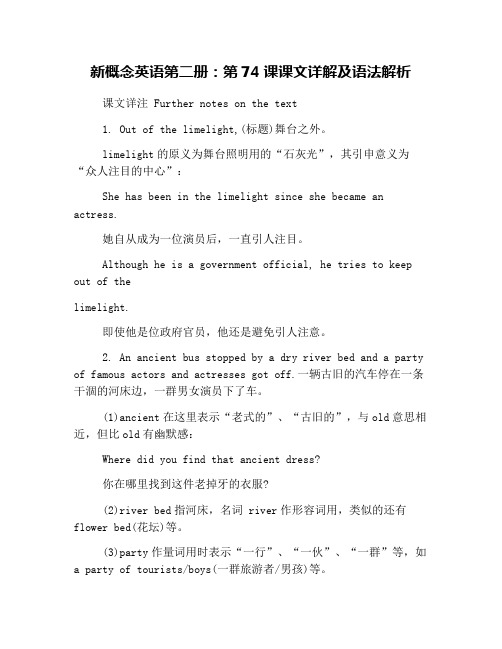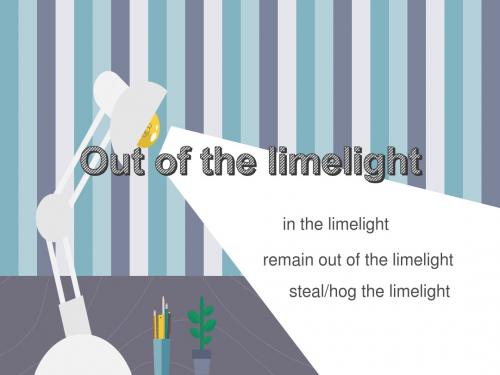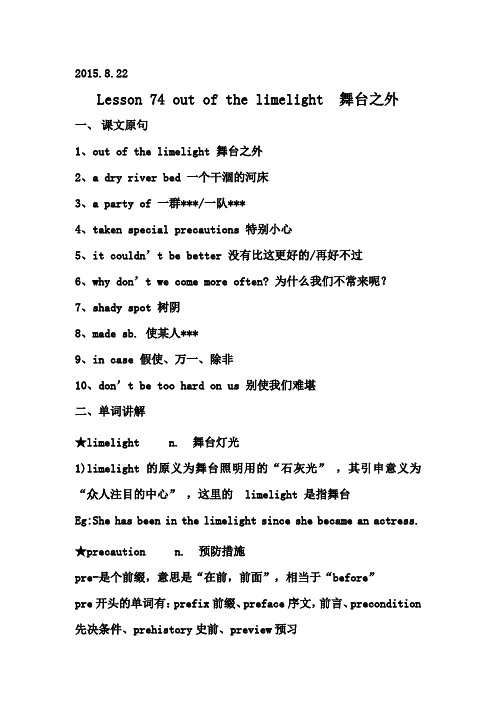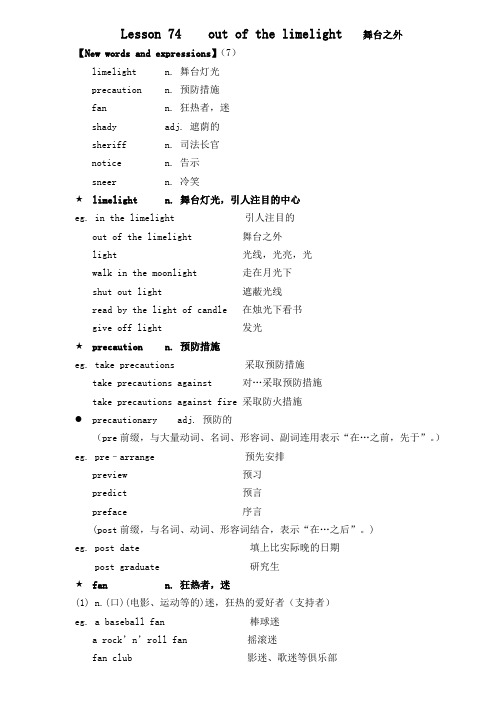新概念英语第二册第74课 Out of the limelight 舞台之外
新概念英语文本第二册Lesson 74

新概念英语文本第二册Lesson 74Lesson 74Out of the limelight舞台之外First listen and then answer the question.听录音,然后回答以下问题。
Why was their disguise 'too perfect'?An ancient bus stopped by a dry river bed and a party of famous actors and actresses got off. Dressed in dark glasses and old clothes, they had taken special precautions so that no one should recognize them. But as they soon discovered,disguises can sometimes be too perfect. 'This is a wonderful place for a picnic,' said Gloria Gleam. 'It couldn't be better, Gloria,' Brinksley Meers agreed. 'No newspaper men, no film fans! Why don't we come more often?' Meanwhile, two other actors, Rockwall Slinger and Merlin Greeves, had carried two large food baskets to a shady spot under some trees. When they had all made themselves comfortable,a stranger appeared. He looked very angry. 'Now you get out of here, all of you!' he shouted. 'I'm sheriff here. Do you see that notice? It says "No Camping" —— in case you can't read!' 'Look, sheriff,' said Rockwall, 'don't be too hard on us. I'm Rockwall Slinger and this is Merlin Greeves.' 'Oh, is it?' said the sheriff with a sneer. 'Well, I'm Brinksley Meers, and my other name is Gloria Gleam. Now you get out of here fast!'New words and expressions 生词和短语limelight n. 舞台灯光precaution n. 预防措施fan n. 狂热者,迷shady adj. 遮荫的sheriff n. 司法长官notice n. 告示sneer n. 冷笑参考译文一辆古旧的汽车停在一条干涸的河床边,一群男女演员下了车。
新概念英语第二册:第74课课文详解及语法解析

新概念英语第二册:第74课课文详解及语法解析课文详注 Further notes on the text1. Out of the limelight,(标题)舞台之外。
limelight的原义为舞台照明用的“石灰光”,其引申意义为“众人注目的中心”:She has been in the limelight since she became an actress.她自从成为一位演员后,一直引人注目。
Although he is a government official, he tries to keep out of thelimelight.即使他是位政府官员,他还是避免引人注意。
2. An ancient bus stopped by a dry river bed and a party of famous actors and actresses got off.一辆古旧的汽车停在一条干涸的河床边,一群男女演员下了车。
(1)ancient在这里表示“老式的”、“古旧的”,与old意思相近,但比old有幽默感:Where did you find that ancient dress?你在哪里找到这件老掉牙的衣服?(2)river bed指河床,名词 river作形容词用,类似的还有flower bed(花坛)等。
(3)party作量词用时表示“一行”、“一伙”、“一群”等,如a party of tourists/boys(一群旅游者/男孩)等。
3. No newspaper men, no film fans! 没有记者,没有影迷!这是个省略句,完整的句子为:There, are no newspaper men and no film fans! 这里的 no与用于公告牌上的no是有区别的。
4. why don't we come more often? 我们为什么不经常来这里呢?"Why+don't/doesn't+主语+动词+?"结构可用来提出建议:I don't like this watch.我不喜欢这块表。
逐句精讲新概念英语第二册第74课 舞台之外

逐句精讲新概念英语第二册:第74课舞台之外Lesson 74 Out of the limelight 新概念英语2课文内容:An ancient bus stopped by a dry river bed and a party of famous actors and actresses got off. Dressed in dark glasses and old clothes, they had taken special precautions so that no one should recognize them. But as they soon discovered, disguises can sometimes be too perfect. "This is a wonderful place for a picnic," said Gloria Gleam. "It couldn't be better, Gloria," Brinksley Meers agreed. "No newspaper men, no film fans! Why don't we come more often?" Meanwhile, two other actors, Rockwall Slinger and Merlin Greeves, had carried two large food baskets to a shady spot under some trees. When they hadall made themselves comfortable, a stranger appeared. He looked very angry. "Now you get out of here, all of you!" he shouted. "I'msheriff here. Do you see that notice? It says "No Camping" -- in case you can't read!" "Look, sheriff," said Rockwall, "don't be too hard on us. I'm Rockwall Slinger and this is Merlin Greeves." "Oh, is it?" said the sheriff with a sneer. "Well, I'm Brinksley Meers,and my other name is Gloria Gleam. Now you get out of here fast!"新概念英语句子讲解:1、An ancient bus stopped by a dry river bed and a party of famous actors and actresses got off. 一辆古旧的汽车停在了一条干涸的河床边,一群的男女演员下了车。
新概念二 74 Out of limelight AntAngelia

我再同意你不过了。 天气再糟糕不过了。
I can't agree you more.
他非常介意。
The weather couldn't be worse.
他毫不介意。
He couldn't care more.
He couldn't care less.
'No newspaper men, no film fans! Why don't we come more often?'
notice
n. 司法长官
n. 告示
sneer
n. 冷笑
Listen & answer these questions:
An ancient bus stopped by a dry river bed and a party of famous actors and actresses got off. Dressed in dark glasses and old clothes, they had taken special precautions so that no one should recognize them.
Dressed in dark glasses and old clothes, they had taken special precautions so that no one should recognize them. dress
我们要给小孩子穿上新衣服,带她到公园去。
We are going to dress the baby in new clothes and take her to the park. The baby is dressed in new clothes.
新概念第二册74课 - 副本

2015.8.22Lesson 74 out of the limelight 舞台之外一、课文原句1、out of the limelight 舞台之外2、a dry river bed 一个干涸的河床3、a party of 一群***/一队***4、taken special precautions 特别小心5、it couldn’t be better 没有比这更好的/再好不过6、why don’t we come more often? 为什么我们不常来呢?7、shady spot 树阴8、made sb. 使某人***9、in case 假使、万一、除非10、don’t be too hard on us 别使我们难堪二、单词讲解★limelight n. 舞台灯光1)limelight 的原义为舞台照明用的“石灰光” ,其引申意义为“众人注目的中心” ,这里的 limelight 是指舞台Eg:She has been in the limelight since she became an actress. ★precaution n. 预防措施pre-是个前缀,意思是“在前,前面”,相当于“before”pre开头的单词有:prefix前缀、preface序文,前言、precondition 先决条件、prehistory史前、preview预习caution n. 警告,小心★fan n. 狂热者,迷1)eg: He is a big fan of basketball.他是一个狂热的篮球迷。
2)n. 风扇Eg: a folding fan 折扇an electric fan 电风扇3)v. 扇,吹, 激起Eg:He fanned his face with a magazine.他用一本杂志向脸上吹风★shady adj. 遮荫的1)adj. 遮荫的,荫凉的shade n. 树荫,阴凉处eg: I lie in the shade of a tree in summer. 夏天我躺在树荫下边。
新概念英语二册超详教案讲义笔记Lesson74outofthelimelight舞台之外

Lesson 74 out of the limelight 舞台之外【New words and expressions】(7)limelight n. 舞台灯光precaution n. 预防措施fan n. 狂热者,迷shady adj. 遮荫的sheriff n. 司法长官notice n. 告示sneer n. 冷笑★limelight n. 舞台灯光,引人注目的中心eg. in the limelight 引人注目的out of the limelight 舞台之外light 光线,光亮,光walk in the moonlight 走在月光下shut out light 遮蔽光线read by the light of candle 在烛光下看书give off light 发光★precaution n. 预防措施eg. take precautions 采取预防措施take precautions against 对…采取预防措施take precautions against fire 采取防火措施●precautionary adj. 预防的(pre前缀,与大量动词、名词、形容词、副词连用表示“在…之前,先于”。
)eg. pre–arrange 预先安排preview 预习predict 预言preface 序言(post前缀,与名词、动词、形容词结合,表示“在…之后”。
)eg. post date 填上比实际晚的日期post graduate 研究生★fan n. 狂热者,迷(1) n.(口)(电影、运动等的)迷,狂热的爱好者(支持者)eg. a baseball fan 棒球迷a rock’n’roll fan 摇滚迷fan club 影迷、歌迷等俱乐部fan letter 仰慕者的来信(2) n. 风扇eg. a folding fan 折扇an electric fan 电扇(3) v. 扇,送风eg. fan a fire 扇火He fanned his face with a magazine. 他用一本杂志向脸上扇风。
新概念二.第74讲.学生版
新概念⼆.第74讲.学⽣版Out of the limelightPart 1 Basic words and expressions课堂内容1. Out of the limelight舞台之外limelight的原义为舞台照明⽤的“⽯灰光”,引申为“众⼈注⽬的中⼼”:in the limelightShe has been in the limelight since she became an actress.Although he is a government official, he tries to keep out of the limelight.2. An ancient bus stopped by a dry river bed and a party of famous actors and actresses got off.(1)Ancient 在这表⽰“⽼式的”、“古旧的”,与old意思相近,但⽐old有幽默感:Where did you find that ancient dress?(2)river bed指河床,名词river作形容词⽤,类似的还有flower bed(花坛)等。
(3)party作量词⽤时表⽰“⼀⾏”、“⼀伙”、“⼀群”等,如a party of tourists/boys3. precaution n 预防措施You?d better take special precautions.Take precautions against fire!4. No newspaper men, no film fans!没有记者,没有影迷!这是个省略句,完整的句⼦为:There are no newspaper men and no film fans! 这⾥的no 与⽤于公告牌上的no是有区别的。
5.fan n 狂热者,迷He?s a big fan of basketball.Both the father and the son are football fans.⽗⼦都是⾜球迷。
裕兴新概念英语第二册笔记_第74课_单词讲解
Out of the limelight 舞台之外Lesson 743-26-2014 New words and expressionslimelight n舞台灯光precaution n预防措施fan n狂热者,迷shady adj遮荫的sheriff n司法长官notice n告示sneer n冷笑limelight n舞台灯光,引人注目的中心in the limelight 引人注目的out of the limelight 舞台之外light n光线,光亮,光walk in the moomlight 走在月光下shut out light 遮蔽光线read by the light of candle 在烛光下读书give off light 发光precaution[c]n预防措施take precautions 采取预防措施take precautions against... 对某事采取预防措施take precautions against fire 采取防火措施eg I took cold pills as a precautions. 我吃感冒药预防感冒。
(cold pills 感冒药)I took cold pills by way of precaution. 我吃感冒药预防感冒。
precautionary adj预防的pre-前缀,与大量动词,名词,形容词,副词连用表示“在…之前,先于”。
pre-arrange预先安排preview预习predict预言preface序言(书前面的)post-前缀,与名词,动词,形容词结合,表示“在…之后”。
post date填上比实际晚的日期post graduate研究生fan1n(口)(电影,运动等的)迷,狂热的爱好者(支持者)a baseball fan 棒球迷a rock‘n' roll fan 摇滚迷eg She is a great fan of the Giants. 她是巨人队的忠实球迷。
新概念第二册词汇随身听(74-96)
Lesson 741 limelight ['laimlait] n.舞台灯光out of the limelight舞台之外She is fond of limelight.她喜欢出风头。
The successful businessman has always been in the limelight.那位成功的商人一直受到公众的瞩目。
2 precaution [pri'kɔ:ʃən] n.预防措施Dressed in dark glasses and old clothes, they had taken special precautions so that no one should recognize them.他们戴着墨镜,穿着旧衣裳,特别小心以防别人认出他们。
They take precautions against fire in the bars.酒吧里采取了预防火灾的措施。
Effective precautions have been taken to prevent children from drowning.已经采取有效措施防止小孩溺水。
3 fan [fæn] n.狂热者,迷No newspaper men,no film fans!没有记者,就没有影迷!Many football fans travelled to Japan and South Korea to watch the World Cup.许多足球迷到日本和韩国观看世界杯比赛。
Crazy fans were waiting in the rain for the arrival of their idol.疯狂的歌迷们在雨中等待偶像的到来。
4 shady ['ʃeidi] a.遮荫的Meanwhile,tow other acttors, Rockwall Slinger and Merlin Greeves, had carried two large food baskets to a shady spot under some trees.此时,另外两位演员,罗克沃尔。
新概念英语第二册74课
' I'm sheriff here. Do you see that notice? It says "No Camping" -- in case you can't read!’ I'm sheriff here. (sheriff 是一种官衔,官衔前面不加冠 词) He is president. 总统(官衔) Who is monitor? 谁是班长(官衔) I am a teacher. teacher 不是官衔,加不定冠词 in case +从句 除非,万一……的话,以防万一 I’m taking a raincoat with me in case I need it. In case he comes/should come, give him this letter. in case of + n. 免得,以防万一 Take your umbrella in case of rain.
precaution n. 预防(措施),防范, 警惕
safety precautions 安全防范 precaution against fire防火 take precautions采取防范措施
You must take all reasonable precautions to protect yourself and your family.
But as they soon discovered, disguises can sometimes be too perfect. too perfect过分完美,太过完美
‘This isa wonderful place for a picnic,’ said Gloria Gleam. It couldn’t be better, Gloria’ Brinksley Meers agreed. ‘No newspaper men, no film fans! Why don't we come more often?’ 否定+比较级=最高级 It couldn’t have been worse.
- 1、下载文档前请自行甄别文档内容的完整性,平台不提供额外的编辑、内容补充、找答案等附加服务。
- 2、"仅部分预览"的文档,不可在线预览部分如存在完整性等问题,可反馈申请退款(可完整预览的文档不适用该条件!)。
- 3、如文档侵犯您的权益,请联系客服反馈,我们会尽快为您处理(人工客服工作时间:9:00-18:30)。
limelight precaution fan shady sheriff notice sneer
n. 舞台灯光 n. 预防措施 n. 狂热者,迷 adj. 遮荫的 n. 司法长官 n. 告示 n. 冷笑
Questions on the text
1.Where did the bus stop and who got off? The bus stopped by a dry river bed and a party of famous actors and actress got off. 2. How were the actors and actress dressed and why had they dressed like this? They were dressed in dark glasses and old clothes because they did not want to be recognized.
prescribe (v.) 事先写好的=规定/开处方
3. shade
Let’s sit in the shade and keep cool. Shady adj. 背阴的, 阴凉的 This is a shady avenue. 靠不住的, 可疑的 He’s a rather shady person.
1. so that VS so…that… I will speak loudly so that you can hear me. John is so honest that we all believe him. (结果状语从句)
2. so that VS in order that in order that可放句首 In order that we might see the sunrise, we started for the peak early.
6、'don't be too hard on us. I'm Rockwall Slinger and this is Merlin Greeves.' be hard on… 对……(过分)严厉 Don’t be too hard on that child. He is always hard on his employee.
3. What did they plan to do by that dry river? They planned to have a picnic. 4. Did they have their picnic at the shady spot in the end? Why or why not? No, they didn’t, because the sheriff appeared and ordered them to move out immediately.
4. sheriff
n. (美国) 司法长官
5. notice
n. Take no notice! v. 1. Sorry, I didn’t notice you. 2. I noticed (that) he left early. 3. I noticed him winking at his brother.
get…off 脱下,除去/取下 Please help me to get the box off the boat. When he got the lid off the box, he saw a man lying in it. get off 没受重伤/重罚而逃脱(常与with 连用) Tom was punished, but Jim go off lightly. I can hardly believe that the thief got off with just a warning.
6. sneer
n. 讥笑的表情 v. sneer at…
laugh, smile, grin, chuckle, sneer
1. laugh 哈哈大笑 We laughed to tears at the funny picture.
2. smile 微笑
3. grin咧着嘴笑 He grinned from ear to ear.
5、'I'm sheriff here. Do you see that notice? It says "No Camping" -- in case you can't read!' I'm sheriff here. (sheriff 是一种官衔,官衔前面 不加冠词) He is president. 总统(官衔) I am a teacher. teacher 不是官衔,加不定冠词 in case +从句 假使,万一……的话,免得, 以防万一(常用于引导条件或目的状语从句,当 句子表示将来的时间时,in case后面必须用现在 时态或 should/might) in case you can't read 除非你们不识字。 I’m taking a raincoat with me in case I need it. In case he comes/should come, give him this letter.
4. chuckle 咯咯的笑 5. sneer 冷笑
Text explanation
limelight
n. 舞台灯光
1、Out of the limelight limelight 的原义为舞台照明用的“石灰光”, 其引申意义为“众人注目的中心”,这里 的 limelight 是指舞台。 She has been in the limelight since she became an actress. Although he is a government official, he tries to keep out of the limelight.
get through ① 通过(考试、测验等) Have you got through your driving test last week? ② 吃掉,喝完,用光 Fancy Helen getting through all the food!
so that引导目的状语从句
get into 进来 I’ve lost my key. I can’t get into the house. get on ① 前进,进展(与get along同义) He is getting on quite well in his new job. ② 继续干;相处融洽(常与 with连用) Tom talked with his brother for a while, and then got on with his homework. He’s so difficult. I can’t get on with him.
get over ① 恢复过来,痊愈 Has your mother got over her illness? ② 解决/结束(某件不愉快但必要做的事)( 常 与 with连用) They wanted to get the job over as quickly as possible.
3、Why don't we come more often? “Why +don’t/doesn’t +主语 +动词?”结构 可用来提出建议: Why don’t you change a watch? 4、'Now you get out of here, all of you!' he shouted. get out of here 从这里走开,滚出去,滚开 get fuck out of here 给我从这滚出去
【Special Difficulties】
与get有关的一些短语动词 get out ① (使)出去/出来(反义词为get into) Why don’t you get the dog out? The door is locked. I can’t get out. ② 走开,滚开(常用于祈使句) Now you get out of here fast!
否定词+比较级=最高级
Couldn’t be better. I can’t agree with you more. We can’t have a worse day.
万一 1. in case 万一 Take a hat with you in case the sun is very hot. 2. in case of 假如 In case of rain they can’t go. in the case of 就...来说, 关于 In the case of women,they have more difficulty in doing their work.
2、An ancient bus stopped by a dry river bed and a party of famous actors and actresses got off. river bed指河床,名词river 作形容词用, 类似的还有flower bed(花坛) party作量词用 时表示“一行,一伙,一群”等,如 a party of tourists/boys(一群旅游者/男孩) 等。
Lesson 74 Out of the limelight
Warming up
1. If you were famous, would you try to hide from the public? Why or why not? 2. What problems or advantages do very famous or very rich people have?
